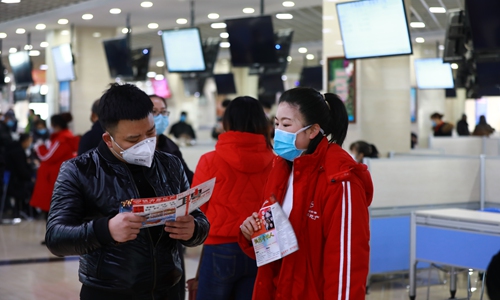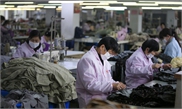Experts give jobs priority over GDP growth in China
China’s March urban unemployment rate hits 5.9%

Job seekers at a job fair in Changchun, Northeast China's Jilin Province on March 12 Photo: IC
The urban unemployment rate in China hit 5.9 percent in March, official data revealed on Friday, highlighting the widespread repercussions of the coronavirus pandemic, which has created fatal challenges for the country's economy and job market, with experts urging policymakers to prioritize the employment above all economic targets.
As work resumption increased, the March data improved from the all-time high of 6.2 percent in February, according to the National Bureau of Statistics (NBS). However, both numbers are above the average level of unemployment rate in China which registered at 4.3 percent during the global financial crisis in 2009.
A 0.3-percentage-point drop in the unemployment rate in March from February is a sign of an improving labor market, but authorities should put employment in the most significant place as external risks mount, Yao Jingyuan, the former chief economist of the NBS, told the Global Times.
"It is not a big matter how China's GDP grows, stabilizing job markets matters a lot," Yao said, noting that migrant workers and college graduates are two groups that should be taken care of the most.
Some of the 8.74 million new college graduates in China have already feared for the scourge of unemployment.
"My job hunting didn't go smoothly and I haven't secured any offer from more than 50 companies yet," Zhang Jing, 22, a senior college student at Xiamen University in East China's Fujian Province, one of the top universities in China, told the Global Times that this year's competition in the job market is "bloody."
If no offer is made from Zhang's dream job at internet or video games companies comes by the end of the month, she will apply for internships and reconsider pursuing graduate studies, which enrolled 189,000 more students compared to 2019.
The pain felt by Zhang and millions of students is real.
According to a survey by Chinese job hunting platform Zhilian Zhaopin, 22.2 percent among the 9,038 enterprises said they have reduced positions for college graduates, and 32.5 per-cent have not made the decision.
A manager of a robotics company based in Southwest China's Chongqing Municipality surnamed Yang told the Global Times on Friday that his company suspended the plan to recruit college graduates due to its strained capital pool from COVID-19.
"Our revenue is dwindling as fewer consumers buy our product. In fact, we don't need so many employees due to weak market de-mand, but we strived not to lay off any employees," Yang said.
However, major internet companies continued to hire due to their thriving even increasing online economy during the epidemic outbreak in China. The open source showed that tech giant Tencent will provide 3,000 internships and positions for college students, as well as another 5,000 for the society - up 25 percent year on year.
Even if NBS spokesperson Mao Shengyong told the press on Friday that there had been no massive lay-offs, analysts noted that the service sector and export-oriented manufacturing have not fully recovered which are seeing "invisible lay-offs," notably in related in-dustries of catering, accommodation, tourism, aviation, and trading-related factories.
"More than 300 million Chinese work in the service sector. If the unemployment rate in this area reaches to only 1 percent, there will be as many as 3 million people losing jobs," Li Chang'an, a professor at the University of International Business and Economics in Beijing, warned.
China's employment market faces massive pressure throughout the year, in the first quarter and second quarter in particular, amid global pandemic outbreak, which threatened the survival of small and medium-sized enterprises (SMEs) that provide more than 80 percent of the job opportunities in the Chinese market, analysts said.
"Most SMEs are in the manufacturing and services sectors. They are extremely vulnerable to economic downturns that suppressed consumers' willingness to spend from home. Slumping foreign orders also crater their revenue. As they downsized employment, millions of migrant workers in China could risk losing their jobs," Cong Yi, a professor at the Tianjin University of Finance and Economics, told the Global Times on Friday.
Among the 290 million migrant workers in China, more than 172.7 million leave hometowns and work in urban areas. NBS said 122.51 million migrant workers had resumed work as of the end of February.
"A great number of migrant workers have rushed to the delivery industry as their original jobs at restaurants or factories cannot continue," a deliveryman surnamed Chen in Beijing told the Global Times, adding he could get the daily wage on the second day of work.
From January 20 to April 9, Meituan Dianping, a Chinese platform, recruited 582,000 employees to join its food delivery network, according to company data. Eleme, Alibaba's flagship takeaway ordering app, also told the Global Times it will provide more than 100,000 jobs in catering and other services industries to 832 poverty-stricken counties this year.
"China should, on the other hand, study how to help companies, in particular SMEs, not lay off workers. It also needs to study how to create more jobs," Yao said.
Cong also pointed out that stabilizing employment is an acute issue, as it not only serves as a barometer of China's economic situation, but more importantly, involves people's income, livelihood and social stability.
"Employment is China's bottom line. By no means should Chinese policymakers prioritize it above all other targets," Cong stressed.
He suggested policymakers to offer employment subsidies to SMEs to help reduce the cost of hiring workers.
Securing employment may promote the opening up and proper adjustment of economic growth, analysts noted. For instance, the infrastructure projects in urban cities could provide more job opportunities.





